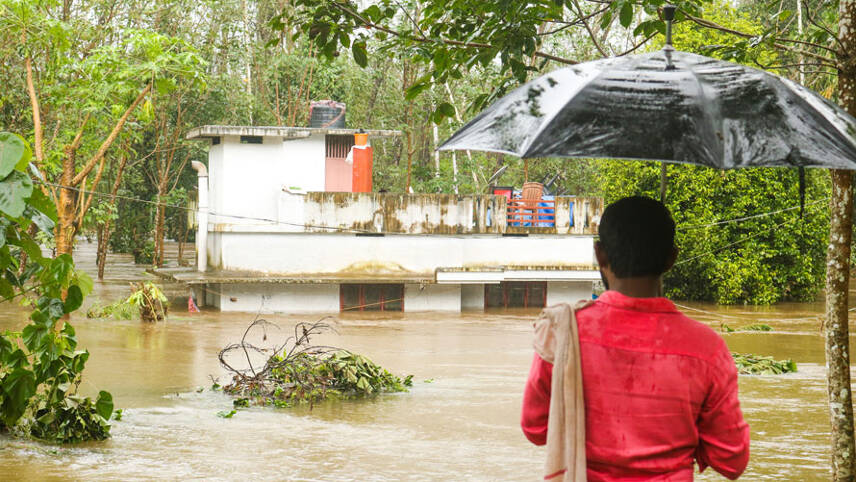Register for free and continue reading
Join our growing army of changemakers and get unlimited access to our premium content

Pictured: Flooding in Kerala, India, in 2018
Published ahead of its annual summit convening world leaders and businesses in Davos, Switzerland, next week, the WEF’s 2024 global risks report details 1,400+ experts’ views on the biggest issues facing the world at present and those on the horizon.
The report assesses how big a risk is in terms of its likelihood and severity of its impact.
Overall, the picture is bleak. 30% of the experts consulted expect an elevated risk of global catastrophe within two years, rising to two-thirds of the experts across a decade.
Concerningly, experts in the private sector were less likely to view environmental risks as imminent in the near-term than their counterparts in policymaking and civil society. There was a general consensus that these risks are real and will materialise to some extent over the next decade, but the WEF found less urgency from corporates and investors.
The biggest perceived near-term risk across all kinds of experts is misinformation and disinformation. This is linked to the third-biggest perceived risk across this timeframe – social polarisation.
As was the case last year, increasingly frequent and severe extreme weather events are ranked as the second-biggest perceived risk for the world in the near future.
Also making the top ten risks and linked to this is involuntary migration. The report notes how this is predominantly driven by conflict at the moment, but climate migration will likely increase over time.
It was confirmed this week by the EU’s climate service that 2023 was the hottest year on record by a significant margin. Days were an average of 1.48C warmer than in pre-industrial times.
Last year, extreme weather events included ‘monster’ flooding Thesally, Greece, often described as the nation’s breadbasket; July heatwaves across North America, Europe and China; and April-May heatwaves across Asia that hit rice production significantly.
The WEF deemed extreme weather risks the top short-term global risk in its 2022 edition of the global risks report.
This year’s report continues to highlight ongoing economic issues, as was the case in 2023. It bears emphasising that the WEF sees investment in the green economy as a way to alleviate the cost-of-living crisis and grow the economy, rather than an economic burden.
Longer-term risks
Looking out to a ten-year period, experts see five of the top ten risks as environmental.
Extreme weather rises to the top of the list while ‘critical change to Earth systems’ comes in at second. This term was not mentioned in the 2023 WEF report but refers to the passage of irreversible tipping points relating to climate, nature and weather systems.
Biodiversity loss and ecosystem collapse along with natural resource shortages round off the top four.
Scientists concur that we are currently either on the cusp of, or in the early stages of, a sixth mass extinction event.
On resource scarcity, humanity extracts 100 billion tonnes of virgin natural materials from the Earth each year – more than it can replenish. Only 7.2% of these resources are either reused or properly recycled.
The WEF’s top ten risks list for the next ten years also includes pollution.
Non-environmental risks making the list are misinformation and disinformation; the adverse impacts of artificial intelligence (AI); cyber insecurity; societal polarisation and involuntary polarisation. Of course, the latter two of these risks do have climate links.
“An unstable global order characterised by polarizing narratives and insecurity, the worsening impacts of extreme weather and economic uncertainty are causing accelerating risks – including misinformation and disinformation – to propagate,” said the WEF’s managing director Saadia Zahidi. “World leaders must come together to address short-term crises as well as lay the groundwork for a more resilient, sustainable, inclusive future.”
Hundreds of decision-makers including policymakers, business leaders and philanthropists are set to convene from 15-19 January for the WEF’s annual summit in Davos. ‘Rebuilding trust’ has been selected as this year’s summit theme.
Related news: UN foresees significant climate risks to food systems, tourism, in 2024


Please login or Register to leave a comment.